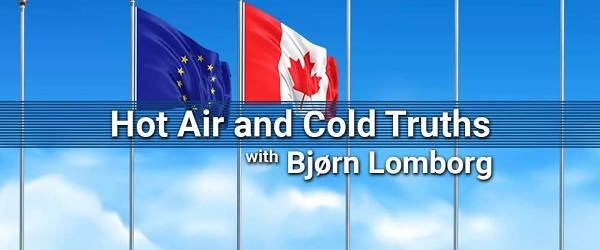Business
The CRTC said it would leave podcasts alone. Turns out that was a myth

From the MacDonald-Laurier Institute
This article originally appeared in the Hub.
By Peter Menzies, October 4, 2023
It’s clear the regulator is about to draw podcasts into its warm embrace.
The CRTC has backtracked on its promise to leave podcasts alone.
On May 12, the federal regulator stated in its “Myths and Facts” release that concerns it would regulate content such as podcasts were a “myth” and the “fact” of the matter was that “a person who creates audio or video content or creates a podcast, is not a broadcaster under” the Online Streaming Act (Bill C-11).
That “fact” didn’t live long. It expired September 29 when, in its first decisions since being granted authority over the internet, the CRTC changed lanes.
While it was careful to state that podcasters themselves don’t have to register with the Commission, the web-based platforms that make podcasts available must do so. Indeed, podcasters may not be broadcasters, but very much as predicted by the legislation’s critics, the CRTC has found ways to bring them into scope anyway.
It decided that podcasts constitute “programs under the Broadcasting Act, given that they are comprised of sounds intended to inform, enlighten or entertain.”
The regulator’s decision further explains that while podcasters may not be broadcasters, the transmission of podcasts over the internet most definitely “constitutes broadcasting” which makes those entities that platform podcasts into cable companies.
So while the CRTC concedes that while “the Broadcasting Act does not give the Commission a mandate to regulate creators of programs” it nevertheless makes clear that its powers do cover “those services that are involved in the broadcasting of programs, which are referred to as broadcasting undertakings.”
Is your head spinning yet?
The legal contortions continue throughout the decision, but the clear takeaway, the bottom line, is that, while it keeps insisting it doesn’t intend to regulate the content of podcasts, it is very concerned about the content of podcasts and if it can’t legally regulate them, it’ll make sure someone else does it for them.
Paragraph 223 of its decision makes it clear the CRTC is about to draw podcasts into its warm embrace.
Without information about online undertakings that transmit or retransmit podcasts, it would be more difficult for the Commission to ensure the achievement of the objectives of … the Broadcasting Act, which relate to, among other things, providing a reasonable opportunity for the public to be exposed to the expression of differing views on matters of public concern, and (that) the programming provided by the Canadian broadcasting system should be varied and comprehensive, providing a balance of information, enlightenment and entertainment for people of all ages, interests and tastes.
In other words, what the CRTC denounced as “myth” in the spring has become a “fact” in the fall. It has kicked open the door to the regulation of online content, if not directly then by proxy through the platforms that deliver the work of podcasters to their audiences.
It is a bureaucratic master stroke.
Here’s what will follow.
The list of intervenors presenting at the CRTC’s public hearing coming up in late November indicates the panel of commissioners will hear from a number of groups that will explain the extent to which they are under-represented and funded. So, a possible outcome of this will be that services that carry podcasts will have to fund podcasters who, on their own, haven’t been able to find an audience.
Just as likely is that platforms will be regulated to ensure podcasts designated by the CRTC are given priority visibility/discoverability online over undesignated podcasts through the manipulation of algorithms. These are likely to be podcasts by Indigenous, BIPOC and LGBTQ2S creators.
As erstwhile CRTC Chair Ian Scott told the Senate committee studying Bill C-11 in 2022:
Instead of saying, and the Act precludes this, we will make changes to your algorithms as many European countries are contemplating doing, instead, we will say this is the outcome we want. We want Canadians to find Canadian music. How best to do it? How will you do it? I don’t want to manipulate your algorithm. I want you to manipulate it to produce a particular outcome. And then we will have hearings to decide what are the best ways and explore it.
This was reinforced in an exchange Scott had with Senator Pamela Wallin, who suggested proponents of the bill were parsing their words and that:
You won’t manipulate the algorithms; you will make the platforms do it. That is regulation by another name. You’re regulating either directly and explicitly or indirectly, but you are regulating content.
To which Mr. Scott replied: “you’re right.”
The CRTC has now confirmed what it denied mere months ago when it was parroting then-Heritage Minister Pablo Rodriguez’s talking points.
It will make sure podcasts and any other internet content it can capture is regulated.
Peter Menzies is a Senior Fellow with the Macdonald-Laurier Institute, a former newspaper executive, and past vice chair of the CRTC.
2025 Federal Election
Does Canada Need a DOGE?

From the Fraser Institute
By Philip Cross
The legions of Canadians wanting to see government spending shrink probably look enviously at how Elon Musk’s Department of Government Efficiency (DOGE) is slashing some government programs in the United States, even if DOGE’s non-surgical chainsaw approach is controversial, to say the least.
Some problems are common to cutting any government’s spending. Ironclad job security for union employees with seniority means cuts are skewed disproportionately to junior staff still on probation, with the regrettable side effect of denying an injection of fresh blood into a sclerotic workforce. Cutting employees and not programs makes it easier for higher staffing to resume: as documented by Carleton University Professor Ian Lee in How Ottawa Spends, even prolonged bouts of austerity do not derail government spending from long-term trend of higher growth. Across the board cuts do not allow for the surgical removal of redundant or inefficient programs and poor performing employees.
Canada has some unique problems with federal government spending. Savoie documents how 41 per cent of federal civil servants are located in Ottawa, versus 16 per cent in Washington and 19 per cent in London, despite Canada having the most decentralized federation in the G7. The concentration in Ottawa partly reflects the exceptional influence exerted by central agencies on all departments. As well, University of Cambridge Professor Dennis Grube found Canada’s civil service was the most resistant to public scrutiny and the most risk adverse in a comparative study of public servants in the U.S., the United Kingdom, Australia, New Zealand and Canada.
Canada’s federal employees are among the most expensive anywhere. The average civil servant costs taxpayers $146,500 a year including all salary, benefits and costs such as computers and training. Multiplying this average cost by 366,316 federal employees yields a total labour bill of $53.7 billion, not including other spending such as $17.8 billion on consultants. All the recent increase in the ranks of the civil service happened in Justin Trudeau’s tenure, expanding 38.5 per cent after Stephen Harper had cut them 9 per cent between 2010 and 2015 in his determination to balance the budget.
While the cost of government employees has risen sharply, the services they provide to the public are dwindling as government spending increasingly is devoted to managing its unwieldy and bloated bureaucracy. As Savoie observes, unions like to paint civil servants as providing essential services such as food inspectors and rescue workers, when in reality most are involved in a vast web of “policy, coordination, liaison, and performance evaluation units.” The fastest growing occupations in the federal government are in administrative services and program administration, whose share of jobs rose from 25.1 per cent in 2010 to 31.9 per cent in 2023 according to the latest report from the Treasury Board.
A chronic problem is the fierce defense offered by public service unions in “protecting non-performers and insulating the public sector from effective outside scrutiny” as Savoie wrote. The refusal to acknowledge and root out non-performers depresses the morale of the average civil servant who’s unfairly tarred with the reputation of a minority. It also motivates the across-the-board chainsaw approach of DOGE, which critics then decry as not discriminating between good and bad employees. The latter could easily be targeted by senior managers, who know exactly who the non-performers are but cannot be bothered with the years of documentation and bureaucratic headaches needed to get rid of them. The cost of poor performers is substantial; if even 10 per cent of the civil service was eliminated as redundant non-performers, the government would save $5.4 billion a year. Potential savings are likely well over $10 billion.
The federal government potentially has enormous leverage in negotiating civil service pay and getting rid of non-performers, because it can unilaterally change the federal pension plan without negotiating with public-sector unions. The federal pension plan is so generous that it’s referred to as the “golden handcuffs” that tie employees to their jobs irrespective of their pay or working conditions. To protect their lucrative pensions, unions inevitably would be willing to make concessions that substantially lower the burden on Canada’s taxpayers and still improve morale within the civil service.
2025 Federal Election
Don’t double-down on net zero again

From the Fraser Institute
In the preamble to the Paris Agreement, world leaders loftily declared they would keep temperature rises “well below 2°C” and perhaps even under 1.5°C. That was never on the cards—it would have required the world’s economies to effectively come to a grinding halt.
The truth is that the “net zero” green agenda, based on massive subsidies and expensive legislation, will likely cost more than CAD$38 trillion per year across the century, making it utterly unattractive to voters in almost every nation on Earth.
When President Trump withdrew the United States from the Paris Climate Agreement for the first time in 2017, then-Canadian Prime Minister Justin Trudeau was quick to claim the moral high ground, declaring that “we will continue to work with our domestic and international partners to drive progress on one of the greatest challenges we face as a world.”
Trudeau has now been swept from the stage. On his first day back in office, President Trump signed an executive order that again begins the formal, twelve-month-long process of withdrawing the United States from the Paris Agreement.
It will be tempting for Canada to step anew into the void left by the United States. But if the goal is to make effective climate policy, whoever is Canada’s prime minister needs to avoid empty virtue signaling. It would be easy for Canada to declare again that it’ll form a “coalition of the willing” with Europe. The truth is that, just like last time, that approach would do next to nothing for the planet.
Climate summits have generated vast amounts of attention and breathless reporting giving the impression that they are crucial to the planet’s survival. Scratch the surface, and the results are far less impressive. In 2021, the world promised to phase-down coal. Since then, global coal consumption has only gone up. Virtually every summit has promised to cut emissions but they’ve increased almost every single year, and 2024 reached a new high.
Way before the Paris Agreement was inked, the Kyoto Protocol was once sold as a key part of the solution to global warming. Yet studies show it achieved virtually nothing for climate change.
In the preamble to the Paris Agreement, world leaders loftily declared they would keep temperature rises “well below 2°C” and perhaps even under 1.5°C. That was never on the cards—it would have required the world’s economies to effectively come to a grinding halt.
The truth is that the “net zero” green agenda, based on massive subsidies and expensive legislation, will likely cost more than CAD$38 trillion per year across the century, making it utterly unattractive to voters in almost every nation on Earth.
The awkward reality is that emissions from Canada, the EU, and other countries pursuing climate policies matter little in the 21st century. Canada likely only makes up about 1.5 per cent of the world’s emissions. Add together Canada’s output with that of every single country of the rich-world OECD, and this only makes up about one-fifth of global emissions this century, using the United Nations’ ‘middle of the road’ forecast. The other four-fifths of emissions come mostly from China, India and Africa.
Even if wealthy countries like Canada impoverish themselves, the result is tiny — run the UN’s standard climate model with and without Canada going net-zero in 2050, and the difference is immeasurable even in 2100. Moreover, much of the production and emissions just move to the Global South—and even less is achieved.

One good example of this is the United Kingdom, which—like Prime Minister Trudeau once did—has leaned into climate policies, suggesting it would lead the efforts for strong climate agreements. British families are paying a heavy price for their government going farther than almost any other in pursuing the climate agenda: just the inflation-adjusted electricity price, weighted across households and industry, has tripled from 2003 to 2023, mostly because of climate policies. This need not have been so: the US electricity price has remained almost unchanged over the same period.
The effect on families is devastating. Had prices stayed at 2003 levels, an average family-of-four would now be spending CAD$3,380 on electricity—which includes indirect industry costs. Instead, it now pays $9,740 per year.
Rising electricity costs make investment less attractive: European businesses pay triple US electricity costs, and nearly two-thirds of European companies say energy prices are now a major impediment to investment.
The Paris Treaty approach is fundamentally flawed. Carbon emissions continue to grow because cheap, reliable power, mostly from fossil fuels, drives economic growth. Wealthy countries like Canada, the US, and European Union members have started to cut emissions—often by shifting production elsewhere—but the rest of the world remains focused on eradicating poverty.
Poor countries will rightly reject making carbon cuts unless there is a huge flow of “climate aid” from rich nations, and want trillions of US dollars per year. That won’t happen. The new US government will not pay, and the other rich countries cannot foot the bill alone.
Without these huge transfers of wealth, China, India and many other developing countries will disavow expensive climate policies, too. This potentially leaves a rag-tag group led by a few Western European progressive nations, which can scarcely afford their own policies and have no ability to pay off everyone else.
When the United States withdrew from the Paris Agreement in 2017, Canada’s doubling down on the Paris Treaty sent the signal that it would be worthwhile spending hundreds of trillions of dollars to make no real difference to temperatures. We fool ourselves if we pretend that doing so for a second time will help the planet.
We need to realize that fixing climate change isn’t about sanctimonious summits, lofty speeches, and bluster. In coming weeks I’ll outline the case for efficient policies like innovation, adaptation and prosperity.
-

 Podcasts2 days ago
Podcasts2 days agoTrump’s Tariffs: The US, Canada, and the rest of the world
-

 Alberta2 days ago
Alberta2 days agoProvince introducing “Patient-Focused Funding Model” to fund acute care in Alberta
-

 2025 Federal Election2 days ago
2025 Federal Election2 days agoMark Carney Comes to B.C. and Delivers a Masterclass in Liberal Arrogance
-

 2025 Federal Election2 days ago
2025 Federal Election2 days agoPoilievre to invest in recovery, cut off federal funding for opioids and defund drug dens
-

 Alberta2 days ago
Alberta2 days agoMedical regulator stops short of revoking license of Alberta doctor skeptic of COVID vaccine
-

 Business2 days ago
Business2 days agoTrump threatens additional 50% tariffs on China, urges ‘patience’
-

 International2 days ago
International2 days agoUN committee urges Canada to repeal euthanasia for non-terminally ill patients
-

 Business1 day ago
Business1 day agoTrump eyes end of capital gains tax in 2025







